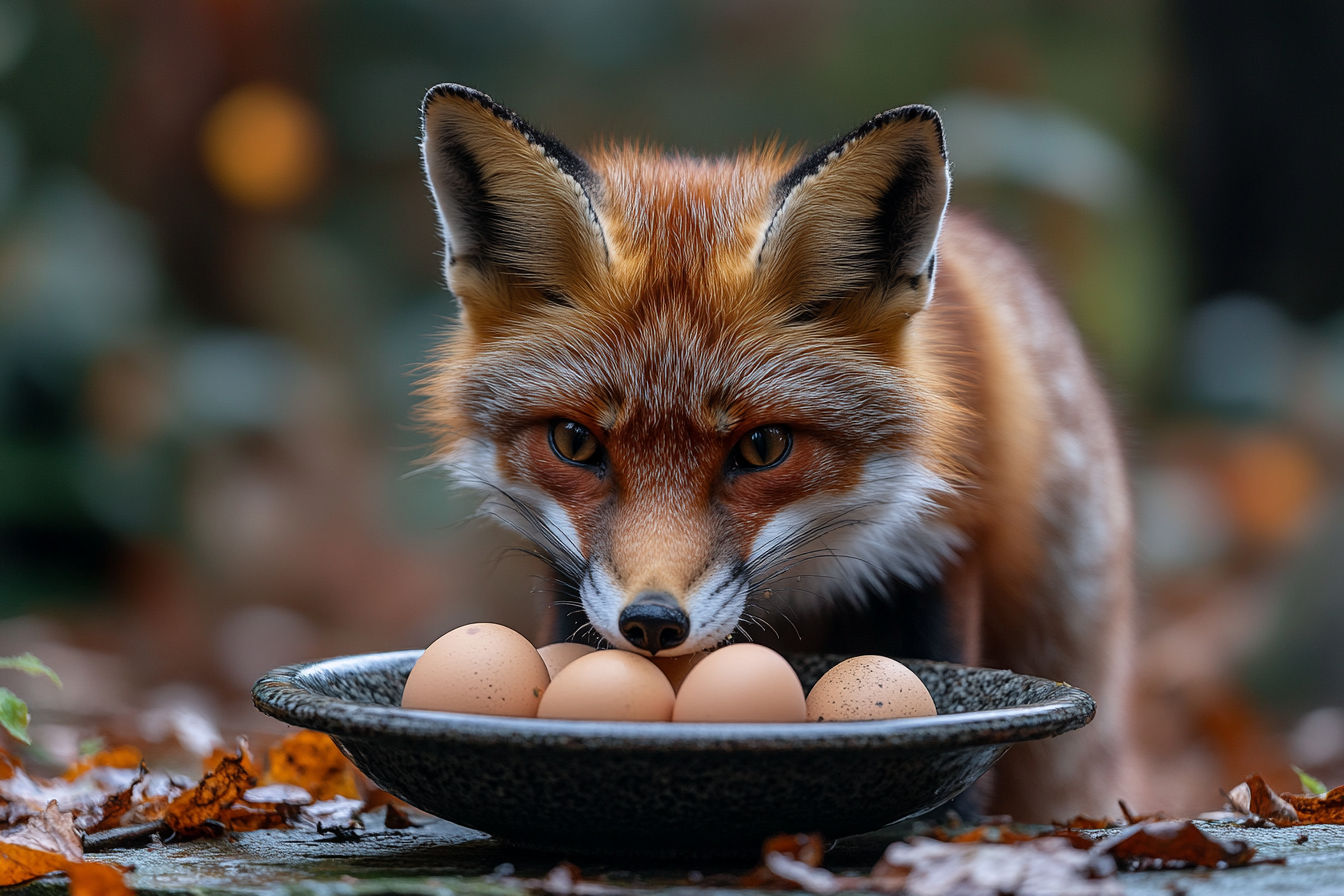What to Feed Foxes: Safe and Responsible Options
Curious about feeding foxes? Learn which foods are safe, what to avoid, and the ethical considerations to keep in mind when feeding these wild animals.

This post may contain affiliate links. If you make a purchase through these links, we may earn a commission at no additional cost to you.
Have you ever spotted a fox in your garden and wondered if you should feed it? Foxes, with their bushy tails and curious nature, often spark a desire to help. But feeding wild foxes isn’t as simple as leaving out scraps—it’s a delicate balance that requires understanding, responsibility, and respect for nature.
Should you feed wild foxes at all? Let’s explore what foxes eat naturally, safe foods to offer, what to avoid, and the ethical considerations of feeding these fascinating creatures.
What Do Foxes Eat in the Wild? The Natural Diet of Foxes
Foxes are adaptable omnivores, thriving in diverse environments from rural fields to bustling cities. Their diet is as varied as their habitats, providing them with the nutrients needed for survival. Here’s what a typical fox enjoys in the wild:
1. Small Mammals: The Protein Powerhouse
Rabbits, mice, voles, and squirrels form a significant portion of a fox’s diet. These small mammals provide essential protein and fats, giving foxes the energy they need to hunt, roam, and raise their young.
2. Birds and Eggs: Opportunistic Delicacies
Foxes are agile hunters and clever opportunists. They often target small birds and raid nests for eggs, especially during the breeding season when these food sources are abundant.
3. Insects and Invertebrates: A Readily Available Snack
During warmer months, foxes feast on beetles, grasshoppers, and earthworms. These creatures offer a quick, nutritious bite, particularly when larger prey is scarce.
4. Fruits and Vegetables: Nature’s Treats
Foxes aren’t strictly carnivorous. Berries, apples, plums, and other fruits become dietary staples, especially in late summer and autumn. These sweet treats provide vital vitamins and hydration.
5. Carrion and Scavenging: Survival in Tough Times
Foxes are opportunistic scavengers. When food is scarce, they turn to carrion—feeding on the remains of dead animals. This behaviour ensures survival during harsh winters or lean times.
What Can You Safely Feed Wild Foxes?
If you decide to feed foxes, the key is mimicking their natural diet to avoid health issues and behavioural changes. Here’s what you can offer:
1. Unseasoned Meat: The Best Choice
Cooked or raw meat (without seasoning) is ideal. Chicken, turkey, and lamb are excellent options. Avoid processed meats like ham or sausages, which contain harmful additives.
2. High-Quality Dog Food: A Convenient Substitute
Dog food, especially protein-rich dry kibble or wet food, can supplement a fox’s diet. Choose brands low in additives and high in natural ingredients.
3. Eggs: Nutritious and Natural
Offer eggs either raw or cooked, without seasoning. Eggs closely replicate a natural part of the fox’s diet, particularly during spring when they would typically raid nests.
4. Fruits: Sweet, but in Moderation
Apples, blueberries, grapes (in moderation), and plums are suitable options. However, avoid overfeeding fruit due to its sugar content. Always ensure fruit is fresh and mould-free.
5. Vegetables: Healthy Additions
Cooked carrots, sweet potatoes, and green beans can be provided occasionally. These should be served plain, without butter, oil, or spices.
6. Safe Leftovers: Keep It Plain
If offering leftovers, ensure they’re free of strong seasoning, sauces, or spices. Plain, cooked meats or vegetables are acceptable—avoid bread, pastries, or pizza.
Remember: The goal is to supplement, not replace, a fox’s natural diet.
What Foods Should You Never Feed Foxes?
Certain foods are toxic or harmful to foxes. Avoid the following:
1. Chocolate:
Contains theobromine, which is toxic and potentially fatal to foxes, even in small amounts.
2. Grapes and Raisins:
Though some foxes may tolerate them, grapes and raisins can cause kidney failure in many animals. It’s best to avoid the risk.
3. Onions and Garlic:
These can cause gastrointestinal issues and damage red blood cells, leading to serious health problems.
4. Sugary Foods:
Cakes, biscuits, and sweets lead to obesity and dental issues. They provide no nutritional value and harm foxes’ health.
5. Processed Foods:
Crisps, chips, and fast food contain unhealthy fats, salts, and preservatives unsuitable for wildlife.
If in doubt, leave it out.
Ethical Considerations: Should You Feed Wild Foxes at All?
Feeding wild foxes is more than an act of kindness—it carries ethical responsibilities. Here are crucial factors to consider:
1. Dependency: A Risk to Survival
Regular feeding can lead foxes to rely on humans, diminishing their natural hunting and foraging skills. In the long term, this dependency could affect their survival if human-provided food becomes unavailable.
Would your feeding habits help them survive—or make them dependent?
2. Human Interaction: A Double-Edged Sword
Feeding foxes can reduce their natural fear of humans, which may lead to dangerous encounters. In urban areas, foxes could be considered pests if they become too bold, increasing the risk of harm to both foxes and humans.
3. Impact on Local Wildlife: Balancing the Ecosystem
Providing food for foxes might unintentionally affect other species. Leftover food can attract rodents, raccoons, or even larger predators, potentially disrupting the local ecosystem.
4. Legal Considerations: Know the Rules
In some regions, feeding wildlife is regulated or discouraged. Before offering food to foxes, check local laws and guidelines to ensure your actions align with wildlife management policies.
How to Feed Foxes Responsibly: Best Practices
If you choose to feed foxes, follow these responsible feeding guidelines:
- Feed Occasionally: Avoid daily feeding to prevent dependency.
- Feed in Small Quantities: Limit portions to encourage natural foraging.
- Maintain Distance: Place food away from homes to prevent foxes from associating people with food.
- Clean Up Leftovers: Prevent attracting unwanted wildlife or causing illness.
Responsible feeding supports fox health without disrupting natural behaviours.
Conclusion: Feeding Foxes—A Delicate Balance
Feeding wild foxes can be a rewarding experience, but it requires thoughtful consideration. Offering foods like unseasoned meat, high-quality dog food, and select fruits and vegetables can benefit foxes if done responsibly. However, avoid harmful foods such as chocolate, onions, and processed items.
Beyond dietary choices, the ethical implications—including dependency, human interaction, and ecosystem balance—must guide your actions. Ultimately, the best approach is to respect foxes as the capable, adaptable creatures they are, ensuring that any human interaction supports, rather than hinders, their natural way of life.
After all, the most meaningful way to help wild foxes is to let them remain wild.






